There was to be no repeat of the final day dramatics from 2015, as France held their nerve in impressive fashion to win a first Grand Slam title in 12 years, while Ireland had to settle for second place and a Triple Crown consolation.
Going into the final ‘Super Saturday’, Ireland knew a win against Scotland would keep their title hopes alive, while they would need England to halt France in Paris, in order to get their hands on the trophy.
Ireland kept up their side of the deal, with a 26-5 win against Scotland at the Aviva Stadium, but the Triple Crown would be their only trophy of the night, as Fabien Galthie’s French side completed a deserved title with a 25-13 win at the Stade de France.
While they couldn’t claim the ultimate prize, Andy Farrell’s side made it four bonus-point wins from five games against a Scottish side that have far greater worries in the coming months, as the relationship between head coach Gregor Townsend and his senior players appears to be deteriorating rapidly.
For large parts of the game, Ireland’s accuracy in attack continued to be inconsistent, while the scrum problem from Twickenham poked its head up in the final quarter.
Ireland flittered between hot and cold throughout, and while Scotland threatened their defence on a number of occasions, particularly early on, Ireland always looked a level ahead when they eventually found their moments of clarity in attack.
First-half tries for the Player of the Match Dan Sheehan and his front row partner Cian Healy saw Ireland 14-5 in front at half time and holding Scotland at arm’s length.
And when Stuart Hogg blew a simple try-scoring chance for Scotland on 48 minutes, they were made to pay. Josh van der Flier powered over for his seventh Test try before the hour mark.
Just as it looked like they would be held out in the final quarter, Conor Murray wrestled his way over to secure maximum points, and put one last nudge of pressure in the direction of the French.
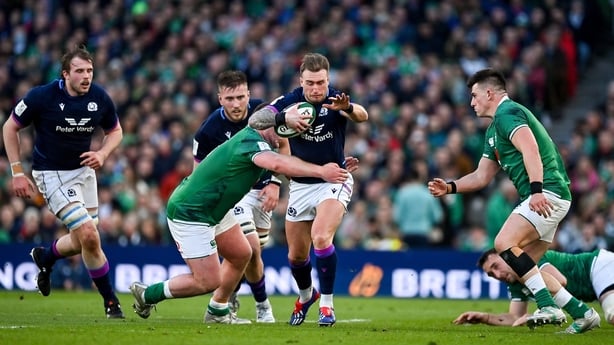
It was an unusually scrappy start from Ireland, with Scotland finding holes in their defence with regularity.
First, Darcy Graham caught Bundee Aki on the outside to break from his own 22, then Ali Price split the Irish line a minute later, before loosehead Pierre Schoeman broke through an unguarded ruck.
But as much as Scotland were creating chances, they weren’t finishing them, with a careless pass from Sam Johnson allowing Ireland relieve the pressure, and an overthrown lineout blowing an opportunity 10 metres out.
If we needed any proof that that 50:22 law has been a gamechanger, Sexton provided it.
Ireland had looked aimless at times in the opening quarter, and the captain had even been guilty of missing touch with a penalty, but when he plonked a kick from inside his own half to within a yard of the Scottish line, the noise alone was enough to shift any Scottish momentum back to the home side.
Van der Flier was held up over the line on the maul, but there was an inevitability to Ireland’s body language all of a sudden, and two minutes later they had their first try.
It was simple execution; Sheehan threw to Henderson at the lineout before regathering at the back of the maul. With a penalty advantage coming, the hooker broke for the line and couldn’t be stopped.
Sexton slotted the conversion from the left of the posts, and Ireland led 7-0 with 17 minutes played.
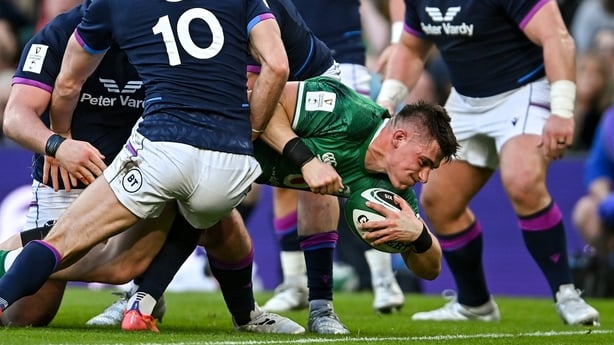
Scotland’s discipline was killing them, with six penalties coughed up inside 25 minutes and two of them needless as they collided with Irish players in the air.
It was stopping their attacks dead, while also giving Ireland the territory that would see them cross for their second try.
On 27 minutes, Sheehan again broke from a maul to gain the initial ground, and after inching their way up to the line it was Healy who picked and jammed his way over for his 10th Test try under the posts, giving Sexton a tap-over conversion to make it 14-0.
There had been a spotlight on Scotland’s new number 10 Blair Kinghorn, and for much of the first half Ireland defensive line had him in their sights. But on 35 minutes his quick hands kept Scotland moving in the Irish 22, which led to their first try.
It ended with Schoeman scrambling over from close range, and while the TMO Stuart Terheege seemed to suggest the loosehead may have taken an extra wriggle along the ground on his way to the line, referee Wayne Barnes wasn’t moved, confirming his on-field decision.
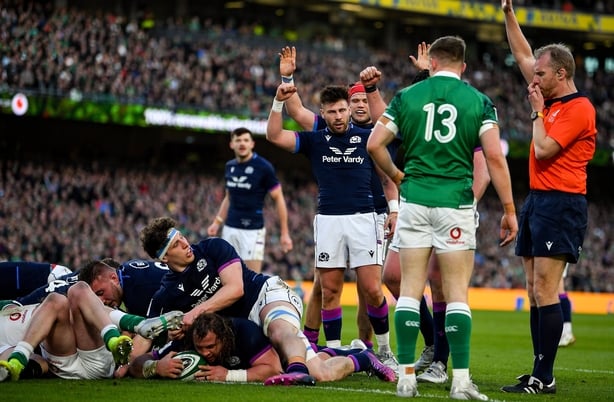
The scores stayed 14-5, as Kinghorn’s conversion drifted right and wide, and despite Furlong winning Ireland a penalty off the restart, some good Scottish maul defence saw them see out the first half just nine points behind.
Ireland almost had their third try early in the second half, courtesy of one of this championship’s favourite routes; a Gibson-Park quick-tap. Just as he did against France and England, the scrum-half pounced on an Irish penalty 10 metres inside the Scottish half, with his sniping run bringing them deep into the 22.
But the attack was cut out some phases later, when the Leinster man’s speculative chip into the in-goal area was dotted down safely by a Scottish defender.
The visitors then had their own chance to attack. Stuart Hogg pounced on a loose ball out wide to break towards the Irish line, and depending on what colours you were wearing, the chance was either snuffed out by a world class piece of defending by Keenan, or the Scottish captain’s own hubris.
As he sprinted to the corner, he had two defenders inside his left shoulder who could have coasted under the posts, but the full-back went alone, Keenan making the tackle and grappling his ankles into touch, bringing back memories of Hogg’s blunder in this fixture two years ago, when he spilled a ball over the try line.
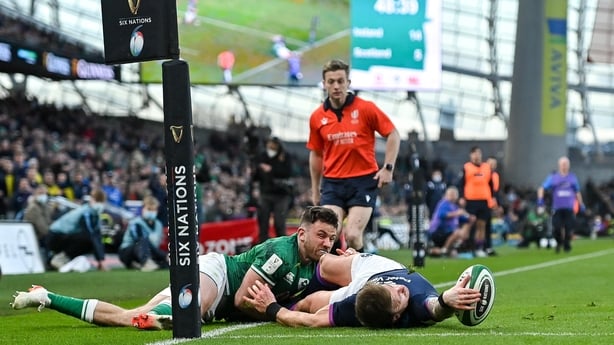
The Irish 15’s intervention was almost irrelevant, as play was stopped for another TMO check on the try-scorer Schoeman, whose fend-off of Henderson looked high and potentially card-worthy. Barnes disagreed and the Scottish prop looked relieved. The Aviva crowd let him know how they felt.
While Scotland were finding new ways to not score, so too, it seemed were Ireland as we moved past 55 minutes. Last week’s failing scrum was suddenly looking destructive, yielding a pair of penalties in the Scottish 22. On both occasions Ireland kicked to the corner. On both occasions knock-ons saw them hand the ball right back.
But while Ireland were struggling with their accuracy, Scotland still looked deflated from that missed opportunity by Hogg.
Eventually, on 59 minutes, Ireland held the ball through multiple phases, notably from the outstanding Sheehan, before Van der Flier’s carry against the grain saw him find the try line.
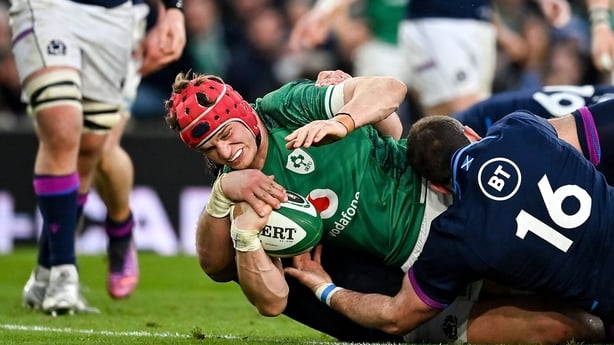
A third Sexton conversion pushed the advantage to 16, 21-5, and Ireland had some breathing room.
But again, they stalled. Their scrum problems from Twickenham suddenly reappeared as they conceded three in a row across the next 15 minutes.
But with Scotland’s discipline in general play so poor they were handed one final chance to secure maximum points, when replacement scrum half Ben White was yellow carded for a deliberate knock-on.
And from the resulting penalty, it was Murray who spun his way out of two tackles to dive over, and cap a Triple Crown success with one final flourish.
Ireland: Hugo Keenan; Mack Hansen, Garry Ringrose, Bundee Aki, James Lowe; Johnny Sexton (capt), Jamison Gibson-Park; Cian Healy, Dan Sheehan, Tadhg Furlong; Tadhg Beirne, Iain Henderson; Caelan Doris, Josh van der Flier, Jack Conan.
Replacements: Rob Herring, Dave Kilcoyne, Finlay Bealham, Kieran Treadwell, Peter O’Mahony, Conor Murray, Joey Carbery, Robbie Henshaw.
Scotland: Stuart Hogg (capt); Darcy Graham, Chris Harris, Sam Johnson, Kyle Steyn; Blair Kinghorn, Ali Price; Pierre Schoeman, George Turner, Zander Fagerson; Jonny Gray, Grant Gilchrist; Rory Darge, Hamish Watson, Matt Fagerson.
Replacements: Fraser Brown, Allan Dell, WP Nel, Sam Skinner, Josh Bayliss, Ben White, Finn Russell, Mark Bennett.





More Stories
Design Considerations for Hermetic Feedthrough in Industrial Systems
Things you must know before becoming an insurance agent
Expert Professional Services Tailored to Your Unique Needs